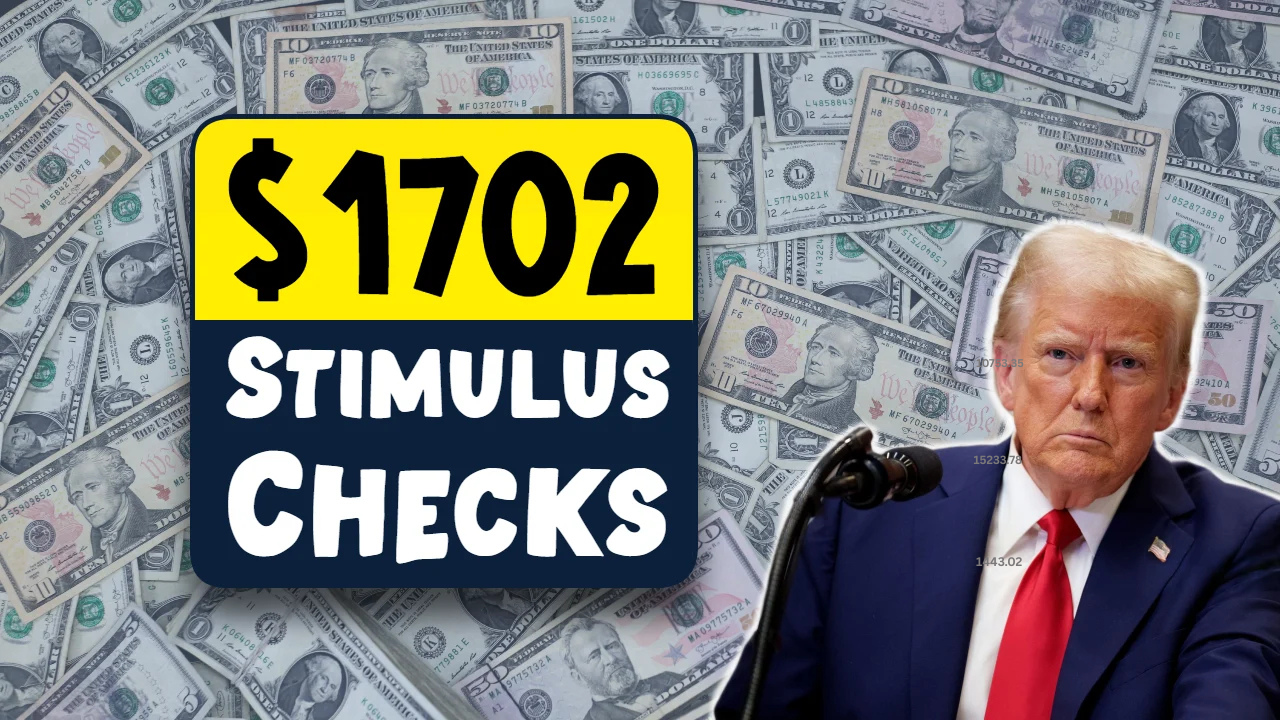$1,702 Stimulus Payment For Everyone:There’s finally some good news for millions of Americans, especially seniors struggling with rising costs. The federal government has announced a $1,702 stimulus payment, due in October 2025. This payment is intended to provide financial relief to eligible citizens, including Social Security and Supplemental Security Income (SSI) beneficiaries, as part of the government’s ongoing efforts to help people cope with inflation and daily expenses.
For retirees and those on fixed incomes, this upcoming payment couldn’t come at a better time. As the cost of food, rent, and healthcare continues to rise, a $1,702 direct deposit or check will provide some much-needed relief and security.
What is The $1,702 Stimulus Payment?
The $1,702 stimulus payment is part of a federal economic relief initiative aimed at assisting low- and middle-income Americans, especially seniors, who rely heavily on Social Security or other federal benefits. While its structure is similar to previous stimulus checks issued during the pandemic, this payment is more focused on long-term economic recovery and household stability.
This payment will be distributed automatically by the Internal Revenue Service (IRS) and the U.S. Treasury Department. The goal is to ensure that all eligible beneficiaries, especially retirees and benefit recipients, receive financial assistance without having to apply separately.
Who Is Eligible for the $1,702 Payment?
The eligibility criteria for this payment are designed to include a wide range of Americans — not just workers, but also retirees and veterans who depend on fixed incomes. According to the IRS and federal guidance, the following individuals are eligible:
-
U.S. citizens or permanent residents with a valid Social Security number.
-
Individuals who filed a 2024 federal income tax return, or who receive benefits from programs like Social Security, SSI, SSDI, or Veterans Affairs (VA).
-
Citizens who meet the income limits:
-
Individuals earning up to $75,000 annually.
-
Married couples filing jointly earning up to $150,000 annually.
-
Heads of household earning up to $112,500 annually.
-
For those whose income exceeds these thresholds, the payment amount will gradually phase out.
Good news for seniors: You don’t need to take extra steps to receive the payment. If you already receive Social Security, SSI, or VA benefits, your payment will automatically be sent to your bank account or debit card, just like your regular benefits.
Full Payment Schedule for October 2025
The IRS has confirmed that payments will be issued in multiple phases during October 2025 to ensure smooth and timely distribution. This schedule will depend on your application method and type of benefit.
The expected payment timelines are as follows:
- October 14-18, 2025: Direct deposits will begin for individuals who have filed bank details with the IRS.
- October 21-25, 2025: Paper checks will be sent to those who do not have direct deposit.
- October 25-31, 2025: SSI, SSDI, and Social Security beneficiaries will receive their payments via direct deposit or Direct Express card.
If you are a senior citizen or veteran who typically receives monthly benefits through a Direct Express debit card, your stimulus payment will automatically appear in that account.
How to Check Your Payment Status
The IRS’s “Get My Payment” tool will be reactivated in October 2025, allowing citizens to check the status of their payments. Through this online portal, you can verify whether your payment has been processed, the amount issued, and the date it was deposited or mailed.
Seniors who do not have internet access can also contact the Social Security Administration (SSA) or IRS helplines for assistance.
Why this payment is important
For millions of seniors living on limited incomes, a $1,702 stimulus payment could make a huge difference. Many retirees are facing rising medical bills, increasing prescription drug prices, and rising utility bills. This payment provides immediate relief to meet essential needs—groceries, electricity bills, rent, or even unexpected emergencies.
Furthermore, this payment aims to stimulate local economies by encouraging spending on everyday necessities, thereby boosting small businesses and community development.
In short, this payment isn’t just about money—it’s about restoring peace of mind and dignity to those who built the country and now deserve financial stability in retirement.
Important IRS Instructions
To ensure you receive your payment without delay:
- Verify your bank account and address information with the IRS.
- File all pending 2024 tax returns, even if your income was low or zero.
Beware of fraud – the IRS will never call, text, or email you asking for personal information. Always check official updates on IRS.gov.
Final Thoughts
The $1,702 stimulus payment is a welcome step for Americans who continue to struggle with financial hardship. For seniors, especially, it represents not only a symbol of support but also recognition of their contributions and resilience.
Since payments are scheduled to begin in October 2025, eligible citizens should prepare by ensuring their IRS or Social Security records are up-to-date. Relief is coming—and for many, it will help make the coming months a little brighter.

